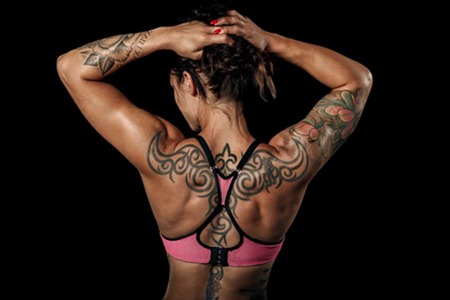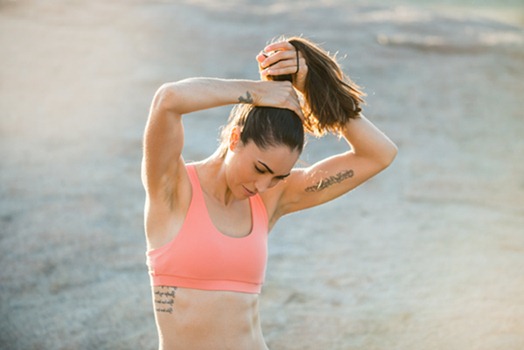Getting a new tattoo can be a great experience, but it also comes with a responsibility to ensure longevity of the artwork and proper healing. One factor that can affect the healing process is sweating. While sweating is a natural and vital bodily function, it can have implications for the healing tattoo. Let’s explore the relationship between sweating and new tattoos and try to understand how to manage this delicate balance.
Is Sweating Bad for A New Tattoo?
Yes, sweating can negatively impact the healing of a new tattoo. Sweating is the body’s way of expelling toxins and regulating temperature. However, when it comes to a new tattoo, the moisture produced by sweat can have adverse effects on the healing process. Fresh tattoos are typically seen as open wounds, and exposing them to excess sweat can create a breeding ground for bacteria. This raises the risk of infection, which can not only impact the appearance of the tattoo but also pose potential health risks.
Will Sweating Ruin a New Tattoo?

While sweating itself won’t necessarily ruin a new tattoo, excessive sweat can have adverse effects on the healing process. Sweat can introduce bacteria, leading to infection, and contribute to blurred lines and color fading. It’s recommended to avoid strenuous activities that lead to profuse sweating during the initial healing phase and to follow proper aftercare instructions to ensure the best outcome for your new tattoo.
Potential Risks
- Color Fading and Blurring: Tattoos relies on the precise injection of ink into the skin’s dermal layer. Excessive moisture, like sweat, can dilute the ink and blur the tattoo’s lines. Moreover, sweat can pull out pigment from the skin as it dries, causing color fading and reduced vibrancy over time.
- Infection: Bacteria thrive in moist environments. Excess sweat can introduce microbes and foreign particles into the tattooed area, potentially leading to infection. Infections can cause pain, swelling, redness, and even pus around the tattoo. This not only impact the healing process but also the overall outcome of the tattoo.
- Delayed Healing: Sweat can reduce the formation of a protective crust or scab over the tattoo, which is cery important for the healing process. Without this barrier, the tattoo is more susceptible to infection, irritation, and prolonged healing times.
Managing Sweating and New Tattoos
- Avoid Overexertion: Strenuous physical activity can cause heavy sweating. Consider taking a break from intense workouts during the initial healing period to prevent sweat from affecting your tattoo.
- Keep It Clean: To reduce the risk of infection, gently clean your tattoo with a fragrance-free, mild soap and lukewarm water. Pat it dry with a towel; avoid rubbing, as it can irritate the skin.
- Stay Hydrated: Staying hydrated helps regulate your body temperature and sweating. Adequate hydration can reduce the intensity of sweating.
- Loose Clothing: Wear breathable, loose clothing that allows air circulation. This can help reduce friction and minimize the accumulation of sweat around the tattooed area.
- Follow Tattoo Artist’s: Every tattoo artist provides some aftercare instructions. These Instructions are tailored to the specific tattoo and should be followed diligently, especially regarding how to handle sweating.
- Minimize Sun Exposure: Sun exposure can lead to sweating and contribute to color fading. Shield your tattoo from direct sunlight and ultraviolet (UV) rays using a broad-spectrum sunscreen with a high SPF or clothing.
FAQs
Are there specific products to help with sweating and tattoo care?
Yes, there are tattoo-specific aftercare products created to help with overall tattoo care and sweating. These products often include moisturizers, gentle cleansers, and protective balms that can create a barrier against sweat, reduce friction, and aid in the healing process.
Should I avoid hot environments while my tattoo is healing to prevent sweating?
Yes, avoiding hot environments can help prevent additional sweating during your tattoo’s healing process. High temperatures can cause increased sweat production, which can potentially affect the overall quality of your tattoo and healing. It’s advisable to keep your tattoo dry, clean, and protected during this time.
How to avoid sweat under tattoo wrap?
To avoid sweat under a tattoo wrap, ensure the wrap is breathable, keep the tattooed area cool and dry, and change it regularly.
How do professional athletes manage sweating and tattoo maintenance?
Professional athletes manage tattoo maintenance and sweating by adjusting training intensity, maintaining proper hygiene, using specialized aftercare products, and consulting experts for personalized advice.
Are there specific fabrics that minimize sweat’s impact on tattoos?
Yes, fabrics like moisture-wicking materials and cotton can help minimize sweat’s impact on tattoos by reducing moisture buildup and allowing better airflow.
Should I avoid saunas and steam rooms while my tattoo is healing?
Yes, it’s advisable to avoid steam rooms and saunas while your tattoo is healing. The moisture and heat in these environments can increase sweating and disrupt the healing process of your tattoo.
Does sweating impact the longevity of a tattoo’s color?
Yes, sweating can potentially affect the longevity of a tattoo’s color. Particularly in the initial healing phase, excessive sweat, can cause color fading and affect the vibrancy of the tattoo over time.
Is it safe to exercise and sweat with a new tattoo?
Exercising and sweating with a new tattoo can increase infection risk and affect proper healing. It’s usually recommended to avoid intense physical activity until the tattoo is fully healed.
In conclusion, while sweating is a vital and natural bodily function, it can have negative implications for a fresh tattoo. The excess moisture can contribute to color fading, increase the risk of infection, and delay the healing process. By taking steps to manage sweating and following proper aftercare instructions, you can ensure the best possible outcome for your new tattoo. Remember, the care you provide during the initial healing phase can have a lasting impact on the longevity of your tattoo art and beauty.


